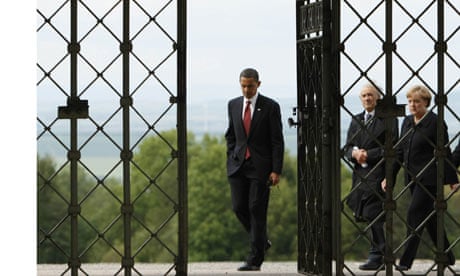Barack Obama visited a former Nazi concentration camp which his great-uncle helped to liberate, laid a white rose at a memorial to its victims, and described the site where 56,000 people died as the "ultimate rebuke" to Holocaust deniers.
After seeing the crematoriums, guard towers and barbed-wire fences, and a clock set at 3:15 – when the camp was liberated on 11 April 1945 – Obama said: "These sites have not lost their horror. More than half a century later, our grief and our outrage have not diminished."
Obama's visit to Buchenwald, which because of the US military's role in its liberation has had a big impact on the US understanding of the Holocaust, gave him the opportunity to revisit themes touched on in his Cairo address on Wednesday, including the need to fight totalitarian ideology. It was also a chance to underline what he described in Egypt as America's "unbreakable" bond with Israel, as well as signalling to domestic and European audiences the important role the US military has played in world history.
He also made a thinly-veiled riposte to Iran's president, Mahmoud Ahmadinejad, who has questioned the Holocaust. "To this day, there are those who insist the Holocaust never happened," Obama said. "This place is the ultimate rebuke to such thoughts, a reminder of our duty to confront those who would tell lies about our history." Earlier, he told NBC the Iranian president "should make his own visit" to Buchenwald. "I have no patience for people who would deny history," he said.
Accompanied by the German chancellor, Angela Merkel, and the Holocaust survivor Elie Wiesel, Obama said the camp had made an deep impression on him since he was told stories of how his great uncle, Charlie Payne, had helped liberate a Buchenwald sub-camp, Ohrdruf, as a member of the US 89th Infantry Division. "I've heard about this place since I was a boy," he said, recounting how Payne had had a "very difficult time readjusting to civilian life" after what he saw at the camp.
The impulse for the visit, during a 20-hour stopover in Germany en route to D-Day commemorations in France, came from the Nobel prize winner Wiesel, who was one of more than 900 children liberated from Buchenwald in April 1945.
On his first return, Wiesel, 80, spoke movingly of watching his father die just days before the camp was freed. "And I thought one day I would come back and talk to him and tell him of the world which had become mine. But can I tell him the world has learnt? I am not so sure." Obama embraced him after the speech.
Obama's Uncle Charlie, now 84, has expressed surprise in interviews with the German media. "We had never talked about that ...This is a trip he chose not because of me, I'm sure, but for political reasons," he told Der Spiegel magazine.
During Obama's election campaign, he referred to a great uncle who was "part of the first American troops to go into Auschwitz and liberate the concentration camps". When it was pointed out that the Red Army liberated Auschwitz, his advisers quickly corrected the name.
Obama said Payne had been so traumatised that "when he came home he just went up into the attic and he didn't leave the house for six months". But Payne implied Obama may have exaggerated.
